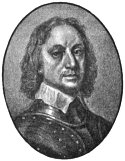When the English Civil War broke out, Cromwell raised a cavalry troop which became the basis of his Ironsides. It was at the Battle of Marston Moor (1644) that Cromwell came to prominence. As leader of the Parliamentarian cause, and commander of the New Model Army which he was instrumental in forming, he defeated King Charles I's, thus bringing to an end the absolute power of the monarchy.
He was a descendant of Catherine Cromwell (born circa 1483) an older sister of Tudor Statesman Thomas Cromwell. Although she was married, her children kept her name, possibly to maintain their connection with their famous uncle. Of these children, Richard Cromwell (c 1500 - 1544) was the father of Henry Cromwell (c 1524 - January 6, 1603). Henry's extravagant tendencies left his heirs including his son Robert Cromwell, Esquire (c 1560 - 1617) with an inheritance that included lands but not money. Oliver was born to Robert Cromwell and his wife Elizabeth Steward or Stewart(1564 - 1654) on April 25, 1599.
Oliver was born in Huntingdon, in the county of Huntingdonshire in East Anglia. He was a gentleman farmer. He was also a devout Puritan. He became the MP for Huntingdon in the Parliament of 1628 - 1629. He began his political career by defending the people of The Fens from wealthy landowners who wanted to drive them out of their land.
Cromwell's influence as a military commander and politician during the English Civil War dramatically altered the military and the political landscape of the British Isles. The so-called "second civil war", which broke out in 1648 after Charles's escape from prison, suggested to Cromwell that no compromise was possible, and he was mainly responsible for pushing through the king's trial and execution.
Cromwell's actions made him very unpopular in Scotland and Ireland which, as nominally independent nations, were effectively conquered by English forces. In particular, Cromwell's suppression of the Royalists in Ireland during 1649 still has a strong resonance for many Irish people. The massacre of nearly 3,500 people in Drogheda after its capture -- comprising around 2,700 Royalist soldiers and all the men in the town carrying arms, including civilians, prisoners, and Catholic priests -- is one of the historical memories that has driven Irish-English and Catholic-Protestant strife during the last three centuries. The fact that the city's defenders continued to fight after the walls had been breached, in violation of the then norms of warfare, was Cromwell's justification for this act.
In the peace following the civil wars, he ruled for several years as Lord Protector of the republican Commonwealth of England but declined the kingship when Parliament offered it to him in 1657. Many of his actions during this period appear unwise or hypocritical. He was savage in putting down the mutinies which occurred within his own army towards the end of the war (prompted by failure to pay the troops) and showed little sympathy for the Levellers, an egalitarian movement which had contributed greatly to Parliament's cause. In 1653, he dismissed the Rump Parliament, and his foreign policy led him into war with the Netherlands. His rule gradually assumed the guise of a military dictatorship.
Within two years of Cromwell's death on September 3, 1658, and his son Richard Cromwell having proved an unworthy successor, Charles II was made King by Parliament.
In 1661 Oliver Cromwell's body was exhumed from Westminster Abbey and was subjected to the ritual of a posthumous execution. He would be interred at Tyburn; his head was buried in the grounds of Sidney Sussex College, Cambridge.
Cromwell came 10th in a popular BBC poll of "Great Britons".
Quotes
- "Let us restore the king to his throne, and let the king in future agree to govern with the consent of Parliament. Let us restore the old church, with its bishops, since that is what most of the people want; but since the Puritans and Separatists and Baptists have served us well in the war, let us not persecute them anymore but let them worship as they like, outside of the established church. And so let us have peace and liberty."
External links
| Preceded by:
Charles I |
List of British Monarchs | Succeeded by:
Richard Cromwell |
